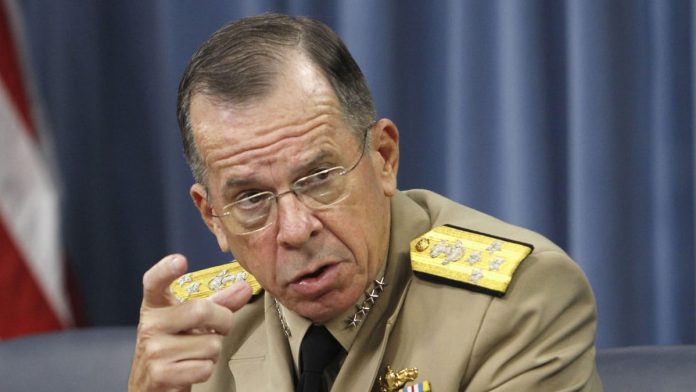The United States has “clearly distanced” itself from Pakistan, former military chief Mike Mullen said as the White House and the State Department publicly reject claims of their involvement in Pakistan’s domestic politics.
“It is difficult, difficult to say,” said Admiral Mullen when asked to describe Washington’s relations with Pakistan, which was once a close US ally in the war against terror and during the cold war.
“I think we have clearly distanced ourselves from Pakistan over the last decade and Pakistan has more and more fallen under the umbrella of China,” he told VOA Urdu Service in Washington this week.
Admiral Mullen, who was chairman of the US Joint Chiefs of Staff from October 2007 to September 2011, was also named in the so-called Memogate controversy, which revolved around a memorandum, ostensibly seeking US support for preventing a feared military takeover in Pakistan that never happened.
He noted that China was not only Pakistan’s neighbour but it “has been supportive of Pakistan” as well.
This closeness, he said, “suits China’s global ambition” because Beijing would prefer to have a neighbor “closer to them and not close to the US”.
For these reasons, the US-Pakistan relationship “is going to… be tense for quite some time,” he added.
Asked if he believed Pakistan helped the Taliban take over Kabul in August last year, Admiral Mullen said: “They did not do much to stop it for sure.”
He recalled that as the US army chief he had told a congressional hearing that Pakistani intelligence agencies were active in Afghanistan “and I still believe … that connectivity is there. It sort of cuts both ways.”
The former US military chief reiterated a complaint that’s often heard in Washington that Pakistan “played on both sides (the US and the Taliban)” in Afghanistan.
On Thursday afternoon, the White House and the US State Department publicly addressed Prime Minister Imran Khan’s claim that foreign powers were supporting the attempt to unseat him.
During a regular press briefing, White House Communications Director Kate Bedingfield, however, rejected this claim as incorrect.
“Absolutely no truth to that allegation,” she said, responding to a question.
At the State Department, spokesperson Ned Price also responded to a question about the alleged US involvement in Pakistan’s domestic politics.
“We are closely following developments in Pakistan, we respect and support Pakistan’s constitutional process and rule of law,” Price said. “However, when it comes to that allegation, there is no truth to it.”
MULLEN, A PAKISTAN ADERVSARY: It may be recalled that Admiral Mike Mullen had been a Pakistan adversary as he had been accusing Islamabad of backing terrorism.
Both the White House and State Department distanced themselves from Mullen’s remarks.
In September 2011, the retiring top military commander Mullen, in his testimony delivered to the Senate Armed Services Committee, called Haqqani a “veritable arm” of Pakistan’s Inter-Services Intelligence (ISI) agency. In the prior written testimony vetted by the National Security Committee, Mullen had a near identical phrase that Haqqani was “in many ways a strategic arm” of ISI.
Mullen’s blunt words created a new rift in the always tenuous US-Pakistani relationship. For instance, the head of Pakistan’s military, Ashfaq Pervez Kayani, called the accusations “very unfortunate and not based on facts.”
“It’s not language I would use,” White House press secretary Jay Carney said when asked about Mullen’s comment. Carney did however emphasise that Pakistan needed to do more to address the “links” between the Haqqani network and Pakistan’s security services.
Other US intelligence officials objected to remarks Mullen made in oral answers to questions when he said the ISI helped plan a September 13 attack by Haqqani on the US embassy in Kabul.
One US official told a newspaper that the “US intelligence does not support the assertion that the ISI had foreknowledge or directed the Sept 13 attack.”
Mullen’s office affirmed that the admiral, who stepped down as chairman of the Joint Chiefs of Staff on September 30, 2022, stood by his testimony to Congress last week.
When Mullen submitted his written testimony to the NSC for a routine review, White House aides urged him to change a section of his testimony where he said the Pakistani government’s support for the Haqqani Network and the Quetta Shura, the leadership council of the Pakistani Taliban, “may violate international norms, potentially warranting sanction.”









